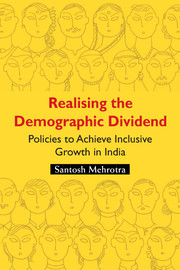Book contents
- Frontmatter
- Contents
- List of Tables and Figures
- Preface
- Acknowledgements
- Part 1 Growth, Employment and Inclusion
- Chapter 1 Capability-centred Approach to Inclusive Growth: Theoretical Framework and Empirical Reality
- Chapter 2 Sustaining Economic Growth
- Chapter 3 Ensuring Higher Agricultural Growth and the Revival of Rural India
- Chapter 4 Addressing the Employment-related Paradoxes of Economic Growth
- Chapter 5 Public Finance: Increasing Fiscal Capacity
- Chapter 6 Skill Development: Finding New Financing Mechanisms to Take Vocational Education and Training to Scale
- Chapter 7 A Common Platform for Skill Development: Implementing the National Skills Qualification Framework
- Part 2 Human Capital Formation
- Part 3 Building a System of Social Protection
- Part 4 Governance
- Index
Chapter 4 - Addressing the Employment-related Paradoxes of Economic Growth
from Part 1 - Growth, Employment and Inclusion
Published online by Cambridge University Press: 05 June 2016
- Frontmatter
- Contents
- List of Tables and Figures
- Preface
- Acknowledgements
- Part 1 Growth, Employment and Inclusion
- Chapter 1 Capability-centred Approach to Inclusive Growth: Theoretical Framework and Empirical Reality
- Chapter 2 Sustaining Economic Growth
- Chapter 3 Ensuring Higher Agricultural Growth and the Revival of Rural India
- Chapter 4 Addressing the Employment-related Paradoxes of Economic Growth
- Chapter 5 Public Finance: Increasing Fiscal Capacity
- Chapter 6 Skill Development: Finding New Financing Mechanisms to Take Vocational Education and Training to Scale
- Chapter 7 A Common Platform for Skill Development: Implementing the National Skills Qualification Framework
- Part 2 Human Capital Formation
- Part 3 Building a System of Social Protection
- Part 4 Governance
- Index
Summary
A credible strategy for achieving inclusive growth in India requires an understanding of the limitations of India's unprecedented high economic growth experienced within the last decade (averaging 8.4 per cent per annum at factor cost over 2003–04 and 2011-12). One limitation of the growth process was discussed in the previous chapter – the relative stagnation of agriculture and the rural distress. This chapter points to several major paradoxes in this economic growth story – especially related to non-agricultural employment – which are a barrier to ensuring inclusiveness in growth.
However, we must begin by noting an important dimension of emerging inclusiveness for which evidence is available. Rapid economic growth within the last decade has been accompanied by a greater degree of social inclusion of the most marginalised communities of India's highly socially stratified society – SC, ST and Muslims; as has been noted in chapter 1. One significant finding of the India Human Development Report 2011 was that most of the social indicators – health, education, employment, access to electricity, water and sanitation – of SCs, STs and Muslims have been improving faster during the decade of the 2000s than the rate at which the same indicators have improved for the nation's population as a whole. We take this faster improvement to be an indicator of convergence in outcomes of human well-being between the marginalised and the rest of the population. However, the paradox is that while indicators of human well-being are improving faster, thus leading to social inclusion of the marginalised, the evidence for labour-intensive growth while clearly present is weaker. (We define inclusive growth as being one where output growth is accompanied by employment growth, especially in non-agricultural occupations, at least as large as the number of new entrants in the labour force, even though employment growth may be proportionally lower than output growth in a given period.) Besides most non-agricultural employment growth is taking place in informal jobs in unregistered enterprises. This is the first paradox discussed in this chapter (section 4.1).
There is a second paradox. Mainstream economic theory assumes that a rise in the rate of output growth will be accompanied by a rise in employment growth, unless accompanied by a still greater rise in rate of growth of labour productivity (the Kaldor-Verdoorn law).
- Type
- Chapter
- Information
- Realising the Demographic DividendPolicies to Achieve Inclusive Growth in India, pp. 122 - 146Publisher: Cambridge University PressPrint publication year: 2015



